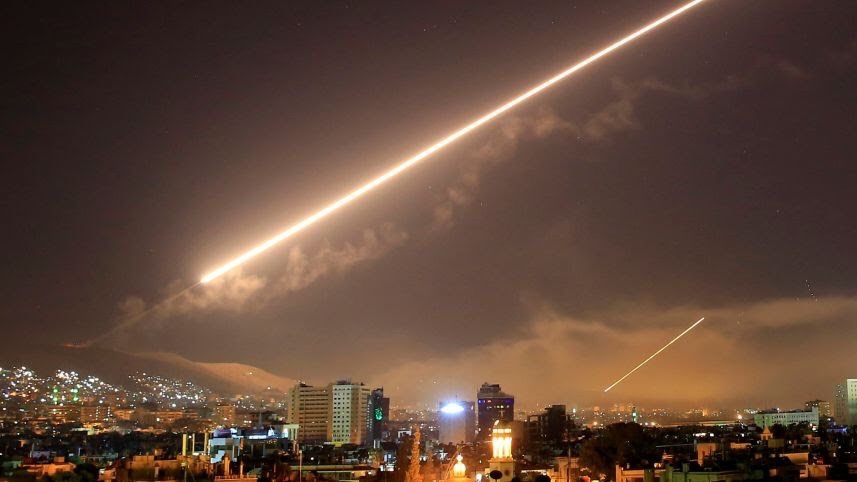
FILE PHOTO: Surface-to-air missile fire lights up the sky over Damascus as the U.S. launches an attack on Syria, April 14, 2018. Hassan Ammar,AP
Israel Says Missile Fired From Syria Intercepted; Reports of IDF Strikes Near Damascus
Sound of loud explosions reported in Damascus ■ Iranian and Hezbollah arms depots reportedly targeted ■ Incident comes days after Netanyahu said may expand military action after U.S. pullout from Syria
Jack Khoury
Yaniv Kubovich
Noa Shpigel
Israel struck an arms depot west Syria's capital city of Damascus from Lebanese airspace, Syrian state media reported late Tuesday night. According to reports three soldiers were wounded in the attack which aimed at Hezbollah depots.
"The aggression originated from above the Lebanese territories and a number of hostile targets were downed," Syrian TV added. SANA state media reported that missiles were indeed intercepted.
The head of the Britain-based Syrian Observatory, Rami Abdel Rahman, said the targets were arms depots that belong to the Iranian Revolutionary Guards and their allies, the Lebanese Shi'ite movement Hezbollah.
The Israeli military spokesman said shortly after that an anti-aircraft missile fired from Syria was intercepted by Israeli air defense systems.
Residents in the area of northern city of Hadera, south of Haifa on the Mediterranean coast, reported seeing a trail in the sky, and residents of Hefer Valley Regional Council, between Netanya and Hadera, reported hearing a loud explosion.
The sound of loud explosions also echoed through Syrian capital city of Damascus, a witness told DPA.
Syrian air defense activity near Damascus, December 25, 2018. SANA
Residents in the area also said that explosions took place around the Al Mezzeh Military Airport west of the capital, reportedly targeted by Israel before, and in the areas of Kesawa and Jimraya, which are located north-west of Damascus.
The residents added that there were at least two rounds of strikes in Kesawa and Jimraya.
Lebanese residents near the border with neighbouring Syria said the sound of planes could be heard in the sky, hinting that Israeli planes were using Lebanese airspace to hit targets inside Syria.
Lebanese state-run National News Agency said Israeli war planes performed mock raids above southern Lebanon, and other media outlets reported that residents near the border with neighboring Syria said the sound of planes could be heard in the sky.
The incident comes two days after Prime Minister Benjamin Netanyahu said that the American military withdrawal from Syria will not affect Israel's policy toward the war-torn country.
"The decision to withdraw 2,000 U.S. troops from Syria will not change our consistent policy: We will continue to act against Iran's attempts to entrench itself militarily in Syria, and to the extent necessary, we will even expand our actions there," Netanyahu said at the start of the weekly cabinet meeting.
Also on Sunday, the Israeli army said soldiers fired toward several gunmen approaching Israel's border with Syria in the Golan Heights. No Israeli forces were wounded and it is unclear whether the gunmen were hit.
In an abrupt policy shift, U.S. President Donald Trump announced last week that Washington would withdraw the roughly 2,000 U.S. troops from Syria, upending a pillar of American policy in the Middle East and alarming U.S. allies.
The decision was followed on Thursday by the surprise departure of U.S. Secretary of Defense Jim Mattis, who in a resignation letter to Trump laid bare the growing divide between the two over foreign policy.
"I would like to reassure those who are concerned. Our cooperation with the U.S. will continue in full and finds expression in many areas: Operations, intelligence and many other security spheres," Netanyahu said.
Israeli army Chief of Staff Lt. Gen. Gadi Eisenkot also commented on Trump's decision Sunday, saying it is "significant," but should not be overblown.
"The Russian presence in Syria since the end of 2015 created a new situation," Eisenkot told a conference at the Interdisciplinary Center in Herzliya.
"It required us to enter a dialogue to create a system to prevent friction, and it has been a factor affecting how we have used force. Through the entire period, I as chief of staff have felt that there has been an understanding regarding Israel's security needs."
Although Russia and Israel established a system to avoid friction between Israeli aircraft operating in Syria and Russian military planes in the area, a Russian aircraft was downed by Syrian anti-aircraft missiles during an Israeli airstrike in September. The Russians blamed Israel for the mishaps, a claim that Israel vigorously denied.
A former head of military intelligence said in November that Israeli strikes on Syria "have been cut almost to zero" since the Russian plane was shot down. Maj. Gen. Amos Yadlin, interviewed on Radio 103, said Iran was "changing tactics" and has been reducing its presence in Syria in favor of Iraq and Lebanon.
"Apart from the Russians' anger with us, I assume they also passed stern messages to the Iranians," he said. "Russia's strategy is to stabilize Syria, and Iran was disrupting that by developing its precision missile facilities."
Russia announced it had delivered the S-300 air defense system to Syria in October. That came after the September 17 downing of a Russian reconnaissance plane by Syrian forces responding to an Israeli airstrike, a friendly fire incident that stoked regional tensions.
AP, DPA and Reuters contributed to this report.
No comments:
Post a Comment